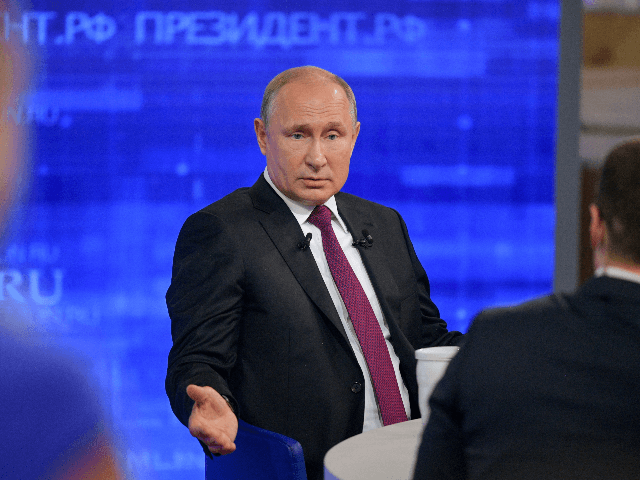Russian President Vladimir Putin had a remarkably difficult time during the 2019 edition of Direct Line, a Russian radio and television program that invites viewers to call in with questions for the chief executive.
Putin’s poll numbers have been sliding, to the extent such things can be measured accurately in Russia, and the hostile questions reflected growing disenchantment with policies.
Radio Free Europe (RFE) reported on Thursday that Putin was peppered with questions about everything from “health care to waste management” during the four-hour broadcast, responding with “vague answers” to most of the inquiries from viewers.
When a caller grilled him about crashing wages and the declining standard of Russian living, Putin promised to “look into” it. The acting governor of the caller’s Murmansk area immediately announced that complaints about low wages would be investigated.
This suspiciously speedy response did not seem to help Putin much, and might even make his situation worse, as Russians will wonder why the president had to be embarrassed on a live television show before he would do anything constructive. According to the RFE report:
Putin’s words appeared to be falling on deaf ears for many Russians, with text messages running on a screen asking tongue-and-cheek questions such as “When will the serfdom system be back? We are waiting for a new landlord, who could buy out our village and create jobs” and “I am eager to change our country! Will you help me?”
Putin eventually turned to Western sanctions on Russia, which he said had cost the country around $50 billion-$55 billion. The president added that Europe had lost more than Russia because of the sanctions, noting that because the moves, Russia was developing its own technologies to replace things that used to be purchased abroad.
The sanctions “in many ways, have mobilized us,” he said.
When asked whether Moscow will take measures to have sanctions lifted and “make peace,” Putin replied that “we don’t have disputes with anyone” and with regards to the West’s attitude toward Russia, “nothing will change anyway if we alter our behavior.”
Blaming U.S. sanctions for his troubles probably will not placate Putin critics. The negative reaction to the show is all the more remarkable because Radio Free Europe noted the whole thing is a carefully orchestrated propaganda exercise that uses hand-picked questions to give Putin an opportunity to shift blame to either foreigners or inept local officials.
Putin makes a great show of taking notes as people ask him questions during the Direct Line program and arranges heavy news coverage for everything his government subsequently does to assist the complainants. The length of the program and the large number of questions he answers are meant to showcase his stamina and concern for the common people.
RFE speculated Putin’s fortunes are declining because sanctions related to Russia’s annexation of Crimea have cost Russia some $300 billion in much-needed foreign investment while almost half of Russian households sink to the poverty line.
Putin tried to use Crimea and separatist warfare in eastern Ukraine as a nationalist cause to rally Russians, but they seem to be souring on the enterprise due to its enormous cost and lack of satisfying resolution. Putin took a stab at claiming the Europeans have suffered far worse from the sanctions than Russia, but that will be a tough sell for Russians who can only dream of maintaining a European lifestyle these days.
Putin made common cause with China, suggesting U.S. sanctions against both Beijing and Moscow were heavy-handed attempts by Washington to thwart their rising power.
“The same thing is happening with regard to Russia and it will keep going, so if we want to win a place under the sun we simply need to get stronger, primarily in the economic sphere,” he said.
Deutsche Welle amusingly noted that when Putin’s approval rating dropped to a record low last month, the Russian state pollster immediately changed its methodology and announced his approval rating had doubled.
Before it was “fixed,” the government poll showed Putin hitting 31.7 percent approval, driven in part by an unpopular decision to raise the pension age so high that the average Russian male could only expect to collect benefits for a year or two before death. There were sizable street demonstrations against the pension changes, and against poor civic services in many Russian cities, which is why Thursday’s Q&A session included questions about waste management.
Since Putin is a personality-cult autocrat, his sinking approval numbers reflect broad Russian discontent with their government as a whole.
The government has been loosening some of its most stringent controls as a result, but this runs the risk of giving Russians more freedom to commiserate and express their skepticism of government reports. Polls indicate most Russians believe the economy is either stagnant or getting worse, despite a rash of reports from Moscow insisting a recovery is underway.
Putin gave an interview after the call-in show in which he said he is not attempting to restore Russia’s superpower status, and in fact believes the West should learn more from the failure of the Soviet Union.
“We don’t want to return to the situation that the Soviet Union was in, when it imposed a way of life, a political system and so on, upon its neighbors, including countries in eastern Europe. It’s counterproductive, it’s too expensive and it has no prospects,” he said.

COMMENTS
Please let us know if you're having issues with commenting.